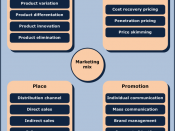Marketing Law and Ethics
Assignment One - Ethics
Being ethical as a marketer has its advantages as well as its disadvantages. The 'negative' advantages are obvious, all of which point to personal and business gain. However, to say that one must act unlawfully to be unethical would be false. The provided statement is completely factual and is particularly relevant to marketing and, more accurately, business, in the fact that "ethics are not, by definition, counterproductive to profit, but may be beneficial to profit."
Hypothetically, a marketer would need to accept the above statement as 'bible' in reference to the marketing mix, or rather simply, 'the four P's (price, product, promotion and placement). The simplistic fundamentals of marketing and business, the marketing mix is essential to the success of a business and their respective products, so it is appropriate that it also be applied to another quintessential factor of business in ethics.
The first and arguably most important aspect of the marketing mix, price can pose quite a few ethical dilemmas and has done so in the past. One example of this is price collusion or price-fixing. This is where a product or service is set at an unreasonable price with knowledge that the consumer can't afford not to purchase the product or service. One such instance of this occurred in America when leading toy chain Toys 'R' Us "violated federal trade laws by colluding with manufacturers to keep prices for Barbie, Mr. Potato Head and other popular toys artificially high." While it was unlawful, it was also an unethical act as well as a form of extortion.
The second factor of the marketing mix, product, is also subjected to ethical dilemmas. Planned product obsolescence is a prime example of an unethical act in relation to product. This...


